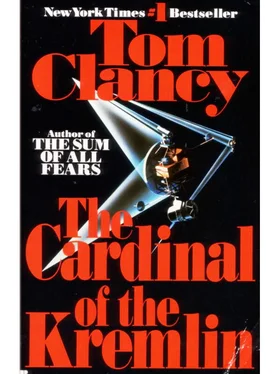Tom Clancy - The Cardinal of the Kremlin
Здесь есть возможность читать онлайн «Tom Clancy - The Cardinal of the Kremlin» весь текст электронной книги совершенно бесплатно (целиком полную версию без сокращений). В некоторых случаях можно слушать аудио, скачать через торрент в формате fb2 и присутствует краткое содержание. Год выпуска: 1988, Жанр: Триллер, на английском языке. Описание произведения, (предисловие) а так же отзывы посетителей доступны на портале библиотеки ЛибКат.
- Название:The Cardinal of the Kremlin
- Автор:
- Жанр:
- Год:1988
- ISBN:нет данных
- Рейтинг книги:3 / 5. Голосов: 1
-
Избранное:Добавить в избранное
- Отзывы:
-
Ваша оценка:
- 60
- 1
- 2
- 3
- 4
- 5
The Cardinal of the Kremlin: краткое содержание, описание и аннотация
Предлагаем к чтению аннотацию, описание, краткое содержание или предисловие (зависит от того, что написал сам автор книги «The Cardinal of the Kremlin»). Если вы не нашли необходимую информацию о книге — напишите в комментариях, мы постараемся отыскать её.
The Cardinal of the Kremlin — читать онлайн бесплатно полную книгу (весь текст) целиком
Ниже представлен текст книги, разбитый по страницам. Система сохранения места последней прочитанной страницы, позволяет с удобством читать онлайн бесплатно книгу «The Cardinal of the Kremlin», без необходимости каждый раз заново искать на чём Вы остановились. Поставьте закладку, и сможете в любой момент перейти на страницу, на которой закончили чтение.
Интервал:
Закладка:
"Isn't it nice to have a day off?"
"Maybe I can arrange one for next week…"
Boris Filipovich Morozov got off the bus an hour after sunset. He and fourteen other young engineers and technicians recently assigned to Bright Star – though he didn't even know the project name yet – had been met at the Dushanbe airport by KGB personnel who'd scrupulously checked their identity papers and photographs, and on the bus ride a KGB captain had given them a security lecture serious enough to get anyone's attention. They could not discuss their work with anyone outside their station; they could not write about what they did, and could not tell anyone where they were. Their mailing address was a post-office box in Novosibiirsk – over a thousand miles away. The Captain didn't have to say that their mail would be read by the base security officers. Morozov made a mental note not to seal his envelopes. His family might be worried if they saw that his letters were being opened and resealed. Besides, he had nothing to hide. His security clearance for this posting had taken a mere four months. The KGB officers in Moscow who'd done the background check had found his background beyond reproach, and even the six interviews that he'd gone through had ended on a friendly note.
The KGB Captain finished his lecture on a lighter note as well, describing the social and sport activities at the base, and the time and place for the biweekly Party meetings, which Morozov had every intention of attending as regularly as his work allowed. Housing, the Captain went on, was still a problem. Morozov and the other new arrivals would be placed in the dormitory – the original barracks put up by the construction gangs who'd blasted the installation into the living rock. They would not be crowded, he said, and the barracks had a game room, library, and even a telescope on the roof for astronomical observation; a small astronomy club had just formed. There was hourly bus service to the main residential facility, where there was a cinema, coffee shop, and a beer bar. There were exactly thirty-one unmarried females on the base, the Captain concluded, but one of them was engaged to him, "and any one of you who trifles with her will be shot! " That drew laughter. It wasn't very often that you met a KGB officer with a sense of humor.
It was dark when the bus pulled through the gate into the facility, and everyone aboard was tired. Morozov was not terribly disappointed at the housing. All the beds were two-level bunks. He was assigned the top berth in a corner. Signs on the wall demanded silence in the sleeping area, since the workers here worked three shifts around the clock. The young engineer was perfectly content to change his clothes and go to sleep. He was assigned to the Directional Applications Section for a month of project orientation, after which he'd receive a permanent job assignment. He was wondering what "directional applications" meant when he drifted off to sleep.
The nice thing about vans was that lots of people owned them, and the casual observer couldn't see who was inside, Jack thought as the white one pulled into his carport. The driver was CIA, of course, as was the security man in the right seat. He dismounted and surveyed the area for a moment before pulling the side door open. It revealed a familiar face.
"Hello, Marko," Ryan said.
"So, this is house of spy!" Captain First Rank Marko Aleksandrovich Ramius, Soviet Navy (retired), said boisterously. His English was better, but like many Russian émigrés he often forgot to use articles in his speech. "No, house of helmsman!"
Jack smiled and shook his head. "Marko, we can't talk about that."
"Your family does not know?"
"Nobody knows. But you can relax. My family's away."
"Understand." Marko Ramius followed Jack into the house. On his passport, Social Security card, and Virginia driver's license he was now known as Mark Ramsey. Yet another piece of CIA originality, though it made perfect sense; you wanted people to remember their names. He was, Jack saw, a little thinner now that he was eating a less starchy diet. And tan. When they'd first met, at the forward escape trunk of the missile submarine Red October , Marko – Mark! – had worn the pasty-white skin of a submarine officer. Now he looked like an ad for Club Med.
"You seem tired," "Mark Ramsey" observed.
"They fly me around a lot. How do you like the Bahamas?"
"You see my tan, yes? White sand, sun, warm every day. Like Cuba when I went there, but nicer people."
"AUTEC, right?" Jack asked.
"Yes, but I cannot discuss this," Marko replied. Both men shared a look. AUTEC – Atlantic Underwater Test and Evaluation Center – was the Navy's submarine test range, where men and ships engaged in exercises called miniwars. What happened there was classified, of course. The Navy was very protective of its submarine operations. So Marko was at work developing tactics for the Navy, doubtless playing the role of a Soviet commander in the war games, lecturing, teaching. Ramius had been known as "the Schoolmaster" in the Soviet Navy. The important things never change.
"How do you like it?"
"Tell this to nobody, but they let me be captain of American submarine for a week – the real Captain he let me do everything, yes? I kill carrier! Yes! I kill Forrestal . They would be proud of me at Red Banner Northern Fleet, yes?"
Jack laughed. "How'd the Navy like that?"
"Captain of submarine and me get very drunk. Forrestal Captain angry, but – good sport, yes? He join us next week and we discuss exercise. He learn something, so good for all of us." Ramius paused. "Where is family?"
"Cathy's visiting her father. Joe and I don't get along very well."
"Because you are spy?" Mark/Marko asked.
"Personal reasons. Can I get you a drink?"
"Beer is good," he replied. Ramius looked around while Jack went into the kitchen. The house's cathedral ceiling towered fifteen feet – five meters, he thought – above the lush carpeting. Everything about the house testified to the money spent to make it so. He was frowning when Ryan returned.
"Ryan, I am not fool," he said sternly. "CIA does not pay so good as this."
"Do you know about the stock market?" Ryan asked with a chuckle.
"Yes, some of my money is invested there." All of the officers from Red October had enough money salted away that they'd never need to work again.
"Well, I made a lot of money there, and then I decided to quit and do something else."
That was a new thought for Captain Ramius. "You are not – what is word? Greed. You have no more greed?"
"How much money does one man need?" Ryan asked rhetorically. The Captain nodded thoughtfully. "So, I have some questions for you."
"Ah, business." Marko laughed. "This you have not forgotten!"
"In your debriefing, you mentioned that you ran an exercise in which you fired a missile, and then a missile was fired at you."
"Yes, years ago – was 1981… April, yes, it was twenty April. I command Delta-class missile submarine, and we fire two rockets from White Sea, one into Okhotsk Sea, other at Sary Shagan. We test submarine rockets, of course, but also the missile defense radar and counterbattery system – they simulated firing a missile at my submarine."
"You said it failed."
Marko nodded. "Submarine rockets fly perfectly. The Sary Shagan radar work, but too slow to intercept – was computer problem, they say. They say get new computer, last thing I hear. Third part of test almost work."
"The counterfire part. That's the first we heard of it," Ryan noted. "How did they actually run the test?"
"They not fire land rocket, of course," Marko said. He held up a finger. "They do this, and you understand nature of test, yes? Soviets are not so stupid as you think. Of course you know that entire Soviet border covered with radar fence. These see rocket launch and compute where submarine is – very easy thing to do. Next they call Strategic Rocket Force Headquarters. Strategic Rocket Force have regiment of old rockets on alert for this. They were ready to shoot back three minutes after detecting my missile on radar." He stopped for a moment. "You not have this in America?"
Читать дальшеИнтервал:
Закладка:
Похожие книги на «The Cardinal of the Kremlin»
Представляем Вашему вниманию похожие книги на «The Cardinal of the Kremlin» списком для выбора. Мы отобрали схожую по названию и смыслу литературу в надежде предоставить читателям больше вариантов отыскать новые, интересные, ещё непрочитанные произведения.
Обсуждение, отзывы о книге «The Cardinal of the Kremlin» и просто собственные мнения читателей. Оставьте ваши комментарии, напишите, что Вы думаете о произведении, его смысле или главных героях. Укажите что конкретно понравилось, а что нет, и почему Вы так считаете.






![Александр Ирвин - Tom Clancy’s The Division 2. Фальшивый рассвет [litres]](/books/417744/aleksandr-irvin-tom-clancy-s-the-division-2-falsh-thumb.webp)





